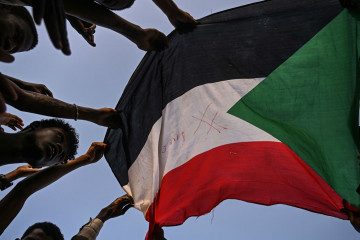

There was a military coup in Sudan on 25 October 2021. The putschists quickly arrested Prime Minister Abdalla Hamdok and other officials who served in the recently dissolved transitional government.
Anti-coup protests in the country have unfortunately turned deadly, with security forces killing and injuring a number of those on the streets demanding civilian rule.
General Abdel Fattah al-Burhan has justified this coup on the grounds that too much political quarrelling was occurring in Sudan and thus military intervention was necessary. The military will appoint a technocratic administration.
"Sudan constituted a threat of a good example of an Arab nation where the people had agency, they thought strategically, they employed strategic non-violent action effectively, and were able to bring down a long-entrenched autocratic regime"
This body will govern until July 2023, when elections are set to take place, according to Burhan. He says that Sudan’s constitution will be rewritten and “young men and women who made this revolution” will participate in the establishment of a new legislative body.
In response, the White House stated that it is “deeply alarmed at reports of a military takeover” and the Biden administration is demanding that authorities release the detained prime minister and other Sudanese officials arrested after the coup.
“The actions today are in stark opposition to the will of the Sudanese people and their aspirations for peace, liberty and justice,” as the White House spokesperson put it. Beyond rhetoric, the US also suspended $700 million in aid to Khartoum because of the coup.
The UN has also condemned the coup. Its Secretary-General said that “there must be full respect for the constitutional charter to protect the hard-won political transition”.
Counter-revolutionary Arab states
In recent years many Sudanese organisations and individuals have worked tirelessly to advance the country along a path to democracy. Yet it is no secret that a host of governments throughout the Arab region have not shared this goal. In fact, Saudi Arabia, the United Arab Emirates (UAE), and Egypt have been particularly opposed to democracy in Sudan.
“Sudan constituted a threat of a good example of an Arab nation where the people had agency, they thought strategically, they employed strategic non-violent action effectively, and were able to bring down a long-entrenched autocratic regime and to make important pathways towards democratic self-governance,” explained Dr Stephen Zunes, a professor of politics and international studies at the University of San Francisco, in an interview with The New Arab.
|
|
Sudan’s democratic project was “obviously something [officials in the UAE, Saudi Arabia, and Egypt] did not want to see succeed. They would find it very much in their interest to see it fail,” according to Dr. Zunes. “Whether they actually played a role in this [coup], I have no idea, but there is no question that [those regional powers] are pleased at these developments”.
The civilian component of Sudan’s transitional government served as an “anchor point of accountability to the military, and they’ve now been removed, which means that the military has probably established itself as the power broker in the country,” Dr Andreas Krieg, an assistant professor at the School of Security Studies at King’s College London, told TNA.
"What we see now is a proper consolidation of military power in Khartoum"
“It does serve Emirati and Egyptian interests to have the last elements of civilian rule removed from that transitional government. What we see now is a proper consolidation of military power in Khartoum.”
Burhan has close ties to the Arab world’s counter-revolutionary bloc. Indeed, such links are well-known. Cairo and Abu Dhabi “will be dominating the post-coup environment and already have the most sustainable relations in the country,” argued Dr Krieg.
“Now with the popular participation and popular accountability removed, I do think that this certainly served [Egypt and the UAE’s] interests. But they don’t necessarily need to be involved like they were involved in the first round of the coup for them to actually be a beneficiary of this.”
Both Tunisia’s 25 July autogolpe and the recent military take-over in Sudan will likely strengthen the UAE’s geopolitical position in the wider Arab world and Africa.
Like Tunisian President Kais Saied’s Napoleonic power-grab, this latest coup in Khartoum speaks to the UAE’s ability to effectively engage Arab/African states and build sustainable networks with powerful institutions in these countries such as, in Sudan’s case, the military. “That the [Sudanese] military is now in charge means that the UAE is really in charge by proxy or surrogate,” argued Dr Krieg.
Nonetheless, it is important to realise that the situation on the ground could evolve in rather unpredictable ways. Key variables in the equation pertain to the actions of anti-coup protestors who are determined to make sacrifices in order to defend civilian rule in Sudan, as well as actions by Western powers.
“It’s not over,” stressed Dr Zunes. “People are resisting. We have seen coup reversals in a number of countries…I can’t say with confidence if this will happen with Sudan…I would encourage you to not assume that this is the final chapter. It’s still an ongoing power struggle.”
Giorgio Cafiero is the CEO of Gulf State Analytics.
Follow him on Twitter: @GiorgioCafiero




 Follow the Middle East's top stories in English at The New Arab on Google News
Follow the Middle East's top stories in English at The New Arab on Google News


